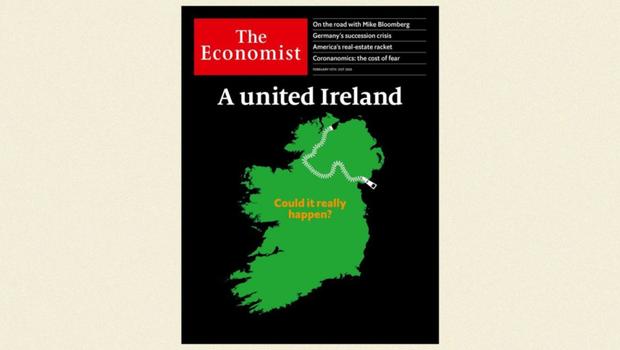By Kevin Henry
The week after the election in the South, which saw Sinn Féin win the largest share of the popular vote as support for the two traditional establishment parties reduced to a historic low, the Economist magazine had a front cover asking if a united Ireland is possible.
The perception that we are moving towards a united Ireland is, of course, not just linked to Sinn Féin’s electoral successes, but important political processes over the last few years. These include the fallout from Brexit, the growth in support for Scottish independence, which has raised a question mark over the future of the United Kingdom, and demographic shifts in the North which could see the Catholic community become a majority by 2021, the centenary of the state. Nonetheless, Sinn Féin’s rise in the South will add to this perception, raising hopes and confidence in the Catholic community and, conversely, increasing fear and nervousness in the Protestant community.
In the context of a restored Stormont Executive, the leading forces of Unionism have not gone on the offensive in response to Sinn Féin’s Southern electoral success. Prominent figures have instead emphasised the correct point that Sinn Féin’s growth was primarily down to a wish for change “domestically” and anger on issues of housing and health, rather than a vote for a united Ireland. This is backed by the exit poll which showed it was not a major reason why people voted.
Border Poll
However, the breaking of the two party system in the South and Sinn Féin’s elevated position will be used by them to increase pressure on this issue. If the establishment parties maintain their effective cordon sanitaire against Sinn Féin, it will allow Sinn Féin to grow further. If Fianna Fáil shifts and is prepared to do business with them, a key demand from Sinn Féin will be a process of preparation for a border poll and a united Ireland. It would also have implications for cross-border bodies and potential future talks, where Sinn Féin would be represented at the table from both sides of the border.
Ultimately, it is the British government which has the power to decide when a border poll should be called. This too will become contested, with nationalists arguing that conditions for a border poll have been met while Unionists oppose, probably with the backing of the British government, which does not wish to legitimise the demand for a second independence referendum in Scotland.
A recent poll suggests that 29% of voters in Northern Ireland would back an all-Ireland state if a border poll were held tomorrow. The Union was supported explicitly by 52%, while the remainder was composed of people who aren’t sure or declined to answer. However, it is likely in the event of such a border poll, with the sectarian polarisation that would accompany it, that these figures would be much closer.
Unity of the working class is paramount
So what do socialists say about a border poll? Our starting point must be the unity of working-class people and, as Socialist Party member Mick Barry TD put it in his first speech in the new Dáil, “We will never support any proposal which heightens sectarian division between Catholic and Protestant.” He went on to say: “We need a Government in Dublin with policies the complete opposite of the neoliberal policies Sinn Féin have implemented in Belfast alongside the DUP. The only basis for unity is through the rejection of sectarian politics with working people uniting to fight for their common class interests.”
Despite the genuine aspiration that exists among many Northern Catholic and in the South for “new Ireland”, a border poll would not be a solution and, in reality, would be a sectarian headcount. The binary choice that would be offered – maintenance of the Union or a capitalist united Ireland – is not a basis to reconcile the two communities here with opposing national identities and aspirations. It would serve only to heighten tensions and pit Catholic and Protestant communities against each other. Nor is it likely the ‘losing side’ would stoically accept the result. It could even begin a process which leads to the re-igniting of sectarian conflict.
What is the socialist solution?
A real solution requires building a movement against those forces with a vested interest in maintaining sectarian division – whether they be Green or Orange. Only by building a movement which unites Protestant and Catholic workers and youth around their common interests and in opposition to the capitalist establishment can we begin to break down the sectarian barriers between our communities.
This would lay the basis for solutions to be found to the difficult questions which divide our communities – including the issue of the border – based upon compromise, mutual respect and solidarity. The Socialist Party argues for a socialist Ireland where the rights of all communities are guaranteed, free from coercion, as part of a democratic, voluntary and socialist federation with Scotland, England and Wales.












